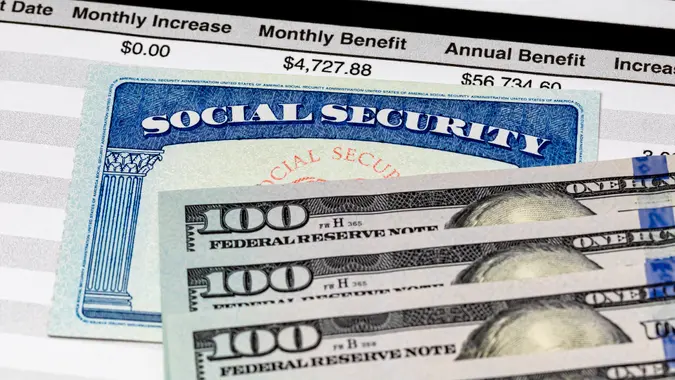The Financial Pros and Cons of Withdrawing Your Social Security Early

Commitment to Our Readers
GOBankingRates' editorial team is committed to bringing you unbiased reviews and information. We use data-driven methodologies to evaluate financial products and services - our reviews and ratings are not influenced by advertisers. You can read more about our editorial guidelines and our products and services review methodology.

20 Years
Helping You Live Richer

Reviewed
by Experts

Trusted by
Millions of Readers
One of the most confusing things about Social Security is when to begin taking distributions. According to the Social Security Administration, you can begin your payments as soon as age 62, but “full retirement age” for most individuals is considered age 67, and you can defer payments to as late as age 70. Thus, starting your Social Security before age 67 (for those born after 1943) is considered to be an “early” withdrawal. But what exactly are the pros and cons of such early withdrawals? Here’s a quick overview of the major things you should consider when making your decision.
See:
Find Out:
Pro: You Get Your Money as Soon as Possible
The most obvious benefit of withdrawing your Social Security early is that you get your money the fastest. If you begin taking out money at age 62, you’ll be withdrawing for a full eight years before those that defer payments until age 70. Although Social Security will always be around, there is talk of the Trust Fund being depleted by 2033 or so. Taking payments as early as possible could be a way to ensure that you get the most money you can out of the program before any changes are enacted.
Be Prepared:
Con: Your Checks Will Be Smaller
The huge downside of taking Social Security early is that you are locking in a lower monthly payout for the rest of your life. For those born in 1943 or later, Social Security payouts rise by 8% per year. If you elect to withdraw your Social Security early, you’ll be forfeiting these built-in gains, which are risk-free but actually close to the long-term average return of the stock market. A monthly payout at age 62 will only be 72.5% of your benefit even at full retirement age of 67, meaning the $2,000 you draw at 62 would be about $2,758 if you waited just five years.
Pro: You’ll Have a Government-Paid Income While You May Still Be in Good Health
The younger you can begin drawing some retirement income, the more likely you are to be in good health. If you start taking your Social Security withdrawals at age 62, you’ll be able to use that money for your dream retirement, whether that means traveling or taking up a new sport like cross-country skiing. Waiting until age 70 makes it more likely that you’ll be slowed down by age and/or health issues and not able to take advantage of your retirement payout as readily. Stop Making
Con: You May Be Reducing the Quality of Your Retirement Lifestyle
If you’re a fit individual with no discernible health issues, you’ll be permanently crippling your retirement lifestyle by taking your Social Security early. If you’re going to live a long life and can instead wait to draw your Social Security, you’ll have a much higher quality of life. The difference between a payout at 62 and one at 70 can be significant, meaning you might be restricted to local travel or even staying at home instead of enjoying cruises and/or international trips, for example. If you intend on being active during your late 60s and 70s, you might be doing yourself a disservice by drawing your Social Security early.
Pro: You’ll Come Out Ahead if You Don’t Hit Your Breakeven Date
As we’ve seen, Social Security payouts are reduced at age 62, increasing through age 67 all the way up until age 70. The total amount you would receive from your Social Security payouts will break even at about age 77. This means that regardless of when you start taking payouts, if you live to age 77, you’ll receive approximately the same total amount. If you don’t anticipate living beyond your breakeven date, whether due to lifestyle choices, personal health or family history, you’ll come out ahead if you start taking payments early. Although the amount will be reduced, you’ll be receiving those payments for a much longer time. Look at it this way — if you start taking a $1,500 payout at age 62, you’ll have received $144,000 (notwithstanding the effect of any inflationary adjustments) by the time you reach age 70.
Are You Doomed To Work Forever?
Con: If You Do Live a Long Life, You’re Leaving Money on the Table
Age 77 might seem like it’s a long ways away, but if you’re already approaching retirement age, your life expectancy is likely longer, particularly if you lead a healthy lifestyle. If you draw your Social Security early and live a long life, you could be leaving a significant amount of money on the table. Imagine a scenario in which you live to age 100, for example. This would mean that at age 70 you still have another 30 years to live. If you permanently reduce your monthly Social Security payout, the wait from age 62 to age 70, or even age 67, would seem like a small price to pay for a higher income for life.
More From GOBankingRates
 Written by
Written by 

























